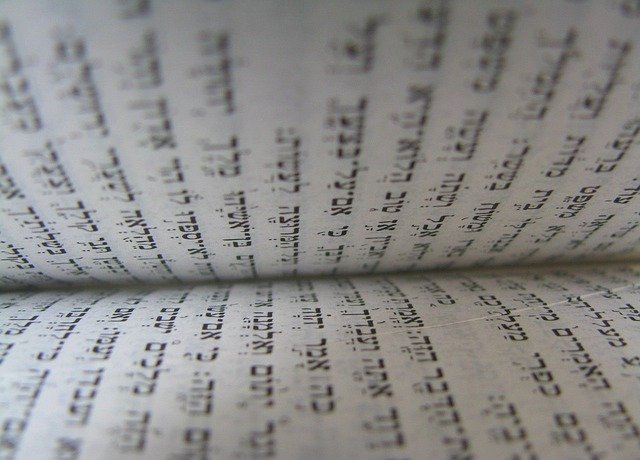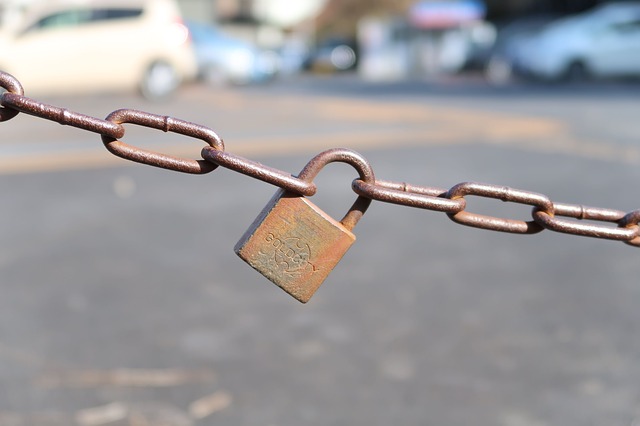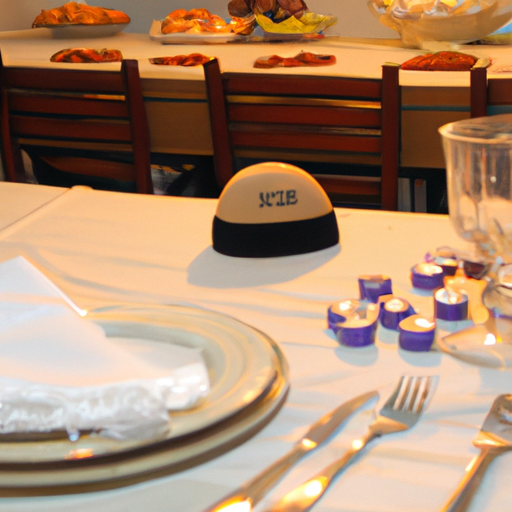The increasing demand for bilingual notary services in English and Hebrew has led to a surge in professionals offering these services. This article explores the role of notary publics, their significance in legal documentation, and their expertise in bridging the language gap between English and Hebrew.
Introduction: The Growing Need for Bilingual Notary Services
With the increasing globalization and cultural diversity of our society, it has become more important than ever to have access to bilingual notary services. Notary services play a crucial role in the authentication and legalization of important legal documents, but they often require proficiency in both English and another language. As a result, there is a growing need for notaries who are proficient in multiple languages, including English and Hebrew.
The importance of bilingual notary services cannot be overstated. Many legal documents require notarization, including contracts, deeds, wills, and powers of attorney. For individuals who speak English and Hebrew, having a notary who can provide services in both languages is essential. This is particularly important for legal documents that are being used in international transactions, where language barriers can create significant challenges.
In addition to facilitating international transactions, bilingual notary services are also important for individuals who have immigrated to the United States from Hebrew-speaking countries. These individuals may require notarization for a wide range of documents, including birth certificates, marriage certificates, and passports. Having access to a notary who can communicate effectively in both English and Hebrew can make the process of obtaining these documents much easier.
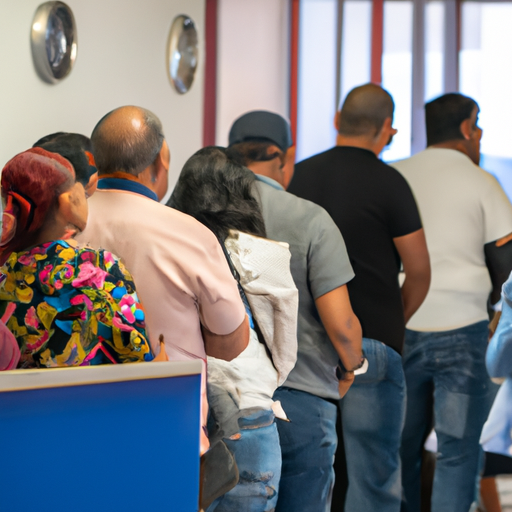
A diverse group of people waiting in line at a bilingual notary office
What Does a Notary Public Do?
A notary public is a licensed professional authorized by the state to witness and certify the signing of important legal documents. Their primary responsibility is to ensure that the person signing the document is who they claim to be and that they are signing the document of their own free will.
Notaries also verify that the document being signed is authentic, and that it has not been altered in any way. They may also administer oaths and affirmations, which are formal declarations made under penalty of perjury.
In addition to these responsibilities, notaries may also be required to maintain a journal of all the documents they have notarized. This journal serves as a record of all the notarial acts performed by the notary, and can be used as evidence in court.
Notaries play a critical role in the legal system, providing assurance that important documents are signed and executed properly. They serve as impartial witnesses to the signing of legal documents, ensuring that they are executed legally and are binding. This is especially important in situations where a document may be challenged in court, as the notary's certification can be used as evidence of the document's authenticity.
"Why is Language Proficiency Essential in Notarization?"
Language proficiency is essential in notarization because notaries must be able to communicate effectively with their clients and understand the documents they are notarizing. In situations where the client speaks a different language than the notary, having a bilingual notary can be extremely helpful.
When notarizing documents in a language that is not the notary's native language, they need to be proficient enough to understand the nuances of the language and ensure that the document is being translated accurately. This is particularly important for legal documents, as even minor errors or inaccuracies in translation can have significant legal consequences.
In addition to language proficiency, notaries also need to have a solid understanding of the cultural context surrounding the document. This is especially important when notarizing documents that are related to immigration, as cultural differences can impact the interpretation of the document.
Having a notary who is proficient in both English and Hebrew is particularly important, as many legal documents in Israel are written in Hebrew. Notaries who are bilingual in English and Hebrew can help bridge the language gap for clients who speak Hebrew as their primary language.
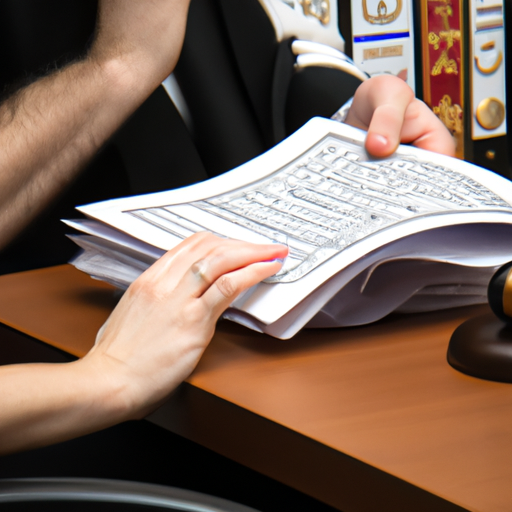
A conversation between a client and a notary, with Hebrew and English documents on the table
Common Documents Requiring English-Hebrew Notarization
There are a variety of legal documents that may require English-Hebrew notarization. One common example is power of attorney documents, which may be needed if someone is physically unable to be present for a legal transaction. These documents give someone else the authority to act on their behalf, and they may need to be notarized in both languages to ensure that all parties involved understand their rights and responsibilities.
Another common document that may require English-Hebrew notarization is a will or a trust. These documents outline how someone's assets should be distributed after their death, and they need to be executed properly to be legally valid. Notarizing these documents in both languages can help ensure that all parties involved understand the terms of the will or trust.
Contracts are another type of document that may require English-Hebrew notarization. Whether it's a lease agreement, a business contract, or a loan agreement, having a notary who is proficient in both languages can help ensure that all parties involved understand the terms of the contract and that it is executed properly.
Real estate documents may also require English-Hebrew notarization, particularly if the property is located in Israel. This may include documents related to buying or selling a property, as well as lease agreements and other legal documents related to real estate transactions.
Finally, immigration documents may require English-Hebrew notarization, particularly if someone is seeking to immigrate to Israel. Notarizing these documents in both languages can help ensure that all parties involved understand the terms of the immigration agreement and that the process is executed properly.
Challenges Faced by Bilingual Notaries
Being a bilingual notary can be challenging, as they must be proficient in both languages and knowledgeable about the legal requirements for notarization. One of the biggest challenges is ensuring that all parties involved understand the terms of the document being notarized. This can be particularly challenging if one or more parties are not fluent in one of the languages being used.
Another challenge faced by bilingual notaries is staying up-to-date on the legal requirements for notarization in both languages. Laws and regulations can vary between different countries and states, and notaries must be familiar with all applicable laws to ensure that the documents they notarize are legally valid.
Bilingual notaries may also face challenges related to cultural differences between the parties involved. Different cultures may have different expectations when it comes to legal documents and notarization, and notaries must be sensitive to these differences to ensure that all parties are comfortable with the process.
Finally, finding qualified bilingual notaries can be a challenge in some areas. While there may be many notaries available who are proficient in one language or the other, finding someone who is proficient in both can be more difficult. This can be particularly challenging for those who need documents notarized in less-commonly spoken languages.

A notary public using a dictionary to cross-reference terms in both languages
The Importance of Finding a Qualified English-Hebrew Notary
When it comes to notarizing documents in English and Hebrew, it is important to find a qualified notary who is proficient in both languages. This ensures that all parties involved understand the terms of the document being notarized and that the document is legally valid. Here are some reasons why finding a qualified English-Hebrew notary is important:
- 1. Legal Requirements:
Notarization is a legal process that requires a notary to verify the identity of the signers and witness the signing of the document. A qualified English-Hebrew notary will be familiar with the legal requirements for notarization in both languages and ensure that all necessary steps are taken to make the document legally valid. - 2. Accuracy:
A notary who is proficient in both languages will be able to accurately translate the document and explain the terms to all parties involved. This is particularly important for legal documents, where even a small error in translation or understanding can have serious consequences. - 3. Time and Money:
Finding a qualified English-Hebrew notary can save time and money in the long run. If the document is not properly notarized, it may need to be redone, which can be costly and time-consuming. By finding a qualified notary upfront, you can ensure that the document is done right the first time.When looking for a qualified English-Hebrew notary, it is important to do your research and ensure that the notary you choose is reputable and experienced. You may want to ask for references or look for reviews online. It is also important to discuss the details of the document being notarized and any special requirements you may have to ensure that the notary is prepared to handle the job.
עבור עוד מידע על נוטריון אנגלית עברית יש לגשת לאתר mkr-law.co.il
Conclusion: Bridging the Language Gap in Legal Documentation
In today's globalized world, it is becoming increasingly common for legal documents to require notarization in multiple languages. This presents a unique challenge for notaries, who must be proficient in both languages to ensure that the document is properly notarized and legally valid.
Finding a qualified English-Hebrew notary is just one example of how we can bridge the language gap in legal documentation. By ensuring that all parties involved understand the terms of the document being notarized, we can prevent costly errors and misunderstandings down the line.
In addition to finding qualified notaries, there are other ways we can bridge the language gap in legal documentation. For example, some legal documents may benefit from having a professional translator review the document before it is notarized. This can ensure that all parties understand the terms of the document and can help prevent costly errors.
Ultimately, bridging the language gap in legal documentation requires a commitment to ensuring that all parties have a clear understanding of the terms of the document being notarized. By doing so, we can prevent costly errors and misunderstandings and ensure that legal documents are properly notarized and legally valid.
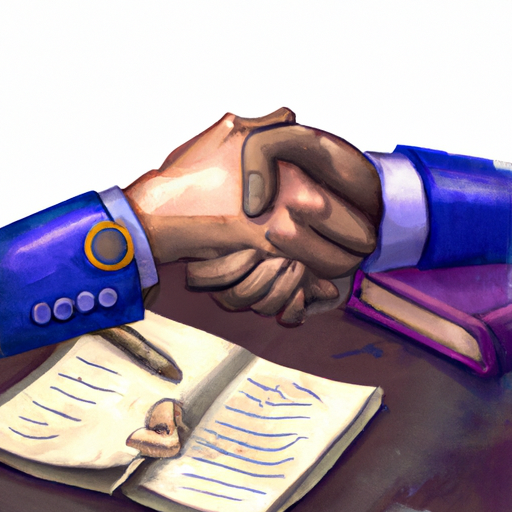
A handshake between a client and a notary, symbolizing a successful transaction
Notary English Hebrew Table:
| Notary Service | Notary Role | Significance | Expertise |
|---|---|---|---|
| English-Hebrew Translation | Legal Documentation | Language Barrier | Bilingual Notaries |
| Contractual Agreements | Witnessing Signatures | Authenticity | Legal Understanding |
| Certifying Documents | Authentication | Legitimacy | Validation |
| Apostille Services | Document Attestation | Verification | International Recognition |
As the world becomes more interconnected, the demand for bilingual notary services will only increase. Professionals skilled in both English and Hebrew play a crucial role in ensuring accurate and legally binding documentation in both languages.
